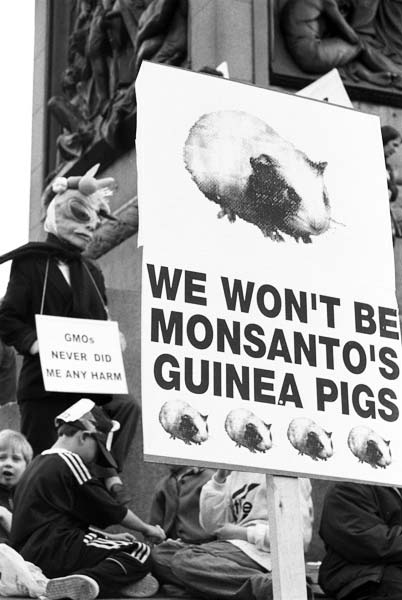|
*This page was produced as part of an assignment for an undergraduate course at Davidson College* GM Crops: A Farmer's Dream? |
|
Conferring Resistance Ramifications |
|
|
Cultural Backlash
Perhaps one of the most visible negative ramifications of the use of genetically modified crops has been the cultural backlash. Farmers are drawing the ire of environmentalists, concerned public, and scientists who are vehemently opposed to the use of this technology in some or all settings. The reasons for their complaints vary in scope. Environmentalists claim that we are destroying the natural order of the world ecosystem and that we are reducing natural diversity by altering the genetic material of a crop plant (Gott, 2002). Some more spiritual environmentalists claim that we are "playing God" by using genetic modification, a very common sentiment. More informed scientists object on the basis of unknown risk or horizontal gene transfer (Gott, 2002). That is, would it be possible for these genes that we insert into our crop plants to escape and create some sort of weed that is then also imbued with quite favorable characteristics (Clupper, 2003). The most horrific of scenarios could be painted using this fear, a gene perhaps escaping to give weeds herbicide resistance and thereby allowing them to choke out all vestiges of a crop (Clupper, 2003). Whether or not these complaints are valid, the protests of these individuals have been enough of a deterrent to genetic modification in the United States that some farmers have completely rejected any future plantings of pesticide resistant crops in the southwest (Lehrman, 1999). Genetic modification is not only giving farmers a bad name and causing them to be even more unappreciated, but it is also wearing on their wallets (Lehrman, 1999). The latter fact is quite ironic considering that financial burden is one of the main things that genetic modification is trying to alleviate (Lehrman, 1999). If genetic modification saves them money only to lose that money again in the future, then what good is the new technology (Lehrman, 1999)?
A protestor of GMOs sign refers to Monsanto, a biotechnology company. (Grove, 2003)
Questions or comments can be directed to matalbert@davidson.edu |

